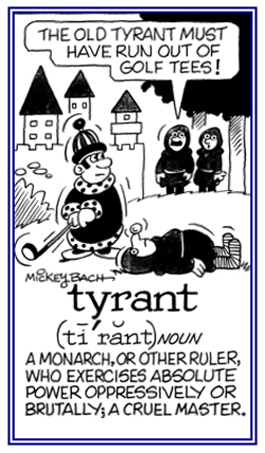tyrann-, tyranni-, tyran-
(Greek > Latin: an absolute ruler; an oppressor, a dictator)
1. Absolute power arbitrarily or unjustly administered; despotism: Certain forms of tyranny can be exemplified by Stalinism, Caesarism, or by a police state.
2. An arbitrarily cruel exercise of power; Mr. Bad's behavior and treatment of his family could be described as a forma of tyranny because he was brutal, dictatorial, harsh, severe, and rough.
3. In Greek history, the office or the administration of a tyrant: The government by a usuper was a kind of tyranny.
4. Etymology: from Old French tyrannie, from Late Latin tyrannia, "tyranny"; which came from Greek tyrannia, from tyrannos, "master, tyrant".
2. An arbitrarily cruel exercise of power; Mr. Bad's behavior and treatment of his family could be described as a forma of tyranny because he was brutal, dictatorial, harsh, severe, and rough.
3. In Greek history, the office or the administration of a tyrant: The government by a usuper was a kind of tyranny.
4. Etymology: from Old French tyrannie, from Late Latin tyrannia, "tyranny"; which came from Greek tyrannia, from tyrannos, "master, tyrant".
1. Someone who rules oppressively or cruelly; a despot: The tyrant, or dictator, in the country governed in an unconstrained way with great power and not by any law.
2. Anyone who exercises absolute power without a legal warrant, whether ruling well or in a bad way: In Ancient Greece, the tyrant, or swayer, had absolute authority and seized legitimate supremacy over the country, as Peisistratos, who succeeded as a tyrant in Athens in 546 B.C.
3. Etymology: from Latin tyrannus, "lord, master, tyrant"; which came from Greek tyrannos, "lord, master, sovereign, absolute ruler".

© ALL rights are reserved.
Go to this Word A Day Revisited Index
2. Anyone who exercises absolute power without a legal warrant, whether ruling well or in a bad way: In Ancient Greece, the tyrant, or swayer, had absolute authority and seized legitimate supremacy over the country, as Peisistratos, who succeeded as a tyrant in Athens in 546 B.C.
3. Etymology: from Latin tyrannus, "lord, master, tyrant"; which came from Greek tyrannos, "lord, master, sovereign, absolute ruler".

Go to this Word A Day Revisited Index
so you can see more of Mickey Bach's cartoons.
Cross references of word families related directly, or indirectly, to: "master, lead, leading, ruler, ruling, govern": -agogic; agon-; arch-; -crat; dom-; gov-; magist-; poten-; regi-.
Showing page 2 out of 2 pages of 17 main-word entries or main-word-entry groups.

